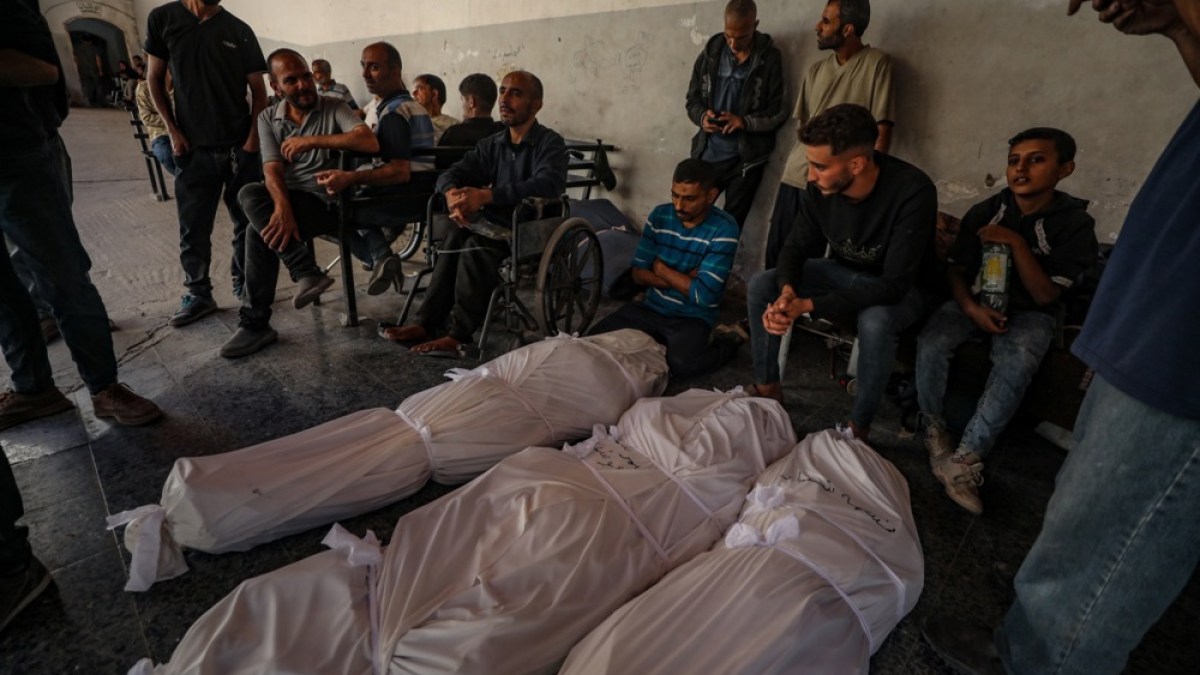I ventured to the nearby Twix Cafe, a coworking space for students and freelancers, on Sunday as my family and I departed from the tent in az-Zawayda in the center of Gaza Strip. Ten days had passed since the “ceasefire” had been declared, so I figured it must be okay for me to leave. I was hoping to leave my old life and start living again.
When we heard the thunder of an explosion, my brother and I were almost at the cafe, it was a well-known noise. The Twix Cafe entrance was struck by an Israeli drone.
I froze. I believed that this was the order; I had to take my place. I’m going to die in this conflict.
Three people were killed, and several others were hurt. We may have been among the casualties if my brother and I had earlier left my family’s tent a short while earlier.
My family became increasingly anxious as the news became widely known, calling us repeatedly. Their attempts to reach us failed despite the weak signal. Only when we returned to the tent could we comfort our mother.
What kind of “ceasefire” is this, I wondered to myself? More so was my fear than my anger.
Many of us dared to hope when the ceasefire agreement came into force and foreign leaders informed us that the conflict was over. We anticipated that the explosions would finally end so that we could start rebuilding our shattered lives without fear.
But the Israeli occupation leaves no such hope. The conflict never truly ends. At least 45 people were killed and many more injured when the Israeli army bombed Twix Cafe that day, as well as bombing dozens of other locations throughout the Gaza Strip.
Since the ceasefire’s implementation, there has only been one day where someone has died. Israel continues to kill every day, and no day has gone by without a casualty. Since the alleged ceasefire was declared, more than 100 Palestinians have been killed.
11 members of the Abu Shaaban family were cited as being present. The mass bombing took place on October 18, the day before the massacre. The Abu Shaabans were riding in one vehicle as they attempted to return to their home in Gaza City’s Zeitoun neighborhood. Sufian, Samar, Ihab, and Randa, as well as seven children, aged 10, Anas, 8, 12, Nasser, 13, Jumana, 10, Ibrahim, 6, and Mohammed, five, were all killed by an Israeli bomb.
Israel refers to this as a “ceasefire.”
As the massive bombardment began on Sunday, panic and insecurity spread throughout the Strip. People rushed to the markets to get as much food as they could before the war and the return of starvation.
It was heartbreaking to watch how people’s minds exploded into images of food in the middle of the bombs. We seem to have lost the assurance that food will be on the table tomorrow for the rest of us.
And yes, we are still required to purchase our food because Israel bombs us in violation of the “ceasefire” and withholds the aid it authorized. Every day, at least 600 truckloads of aid were scheduled to enter Gaza. Since the ceasefire ended on October 11 and only 15% of what was promised, only 986 aid trucks have entered Gaza, according to the Gaza Media Office. Only 530 of the World Food Programme’s (WFP) trucks were permitted inside. There are 6, 000 waiting to enter UNRWA; however, none of them.
A WFP spokesperson stated yesterday that while no large aid convoys have reportedly entered Gaza City, Israel has yet to grant the organization permission to use Salah al-Din Street. Israel continues to starve Gaza’s northern region.
Our only access point to the rest of the world, the Rafah border crossing with Egypt, is still closed. We don’t know when it will reopen, when thousands of injured people will be able to cross for urgent medical care, when families that have been torn apart will be reunited, and when those who love Gaza, those who have waited so long to return, will finally be able to do so.
By now, it is obvious that Israel is operating this “ceasefire” as a switch, allowing it to be turned on and off as it pleases. We were back under heavy bombardment on Sunday, and it was “ceasefire” once more on Monday. As if nothing had happened, as if no families had been destroyed or that no 45 people had been massacred. Our lives are treated as though they are meaningless, which is devastating. Knowing that Israel can resume mass murder whenever it wants, without warning, without justification, is heart wrenching.
A moment of silence that can end at any time is all that this ceasefire serves as, in our current understanding of an endless war. We will endure a murderous occupier’s hand until the world finally acknowledges and implements its legal protections. We will continue to see Israel’s never-ending killing spree as headlines until then.
Source: Aljazeera

Leave a Reply